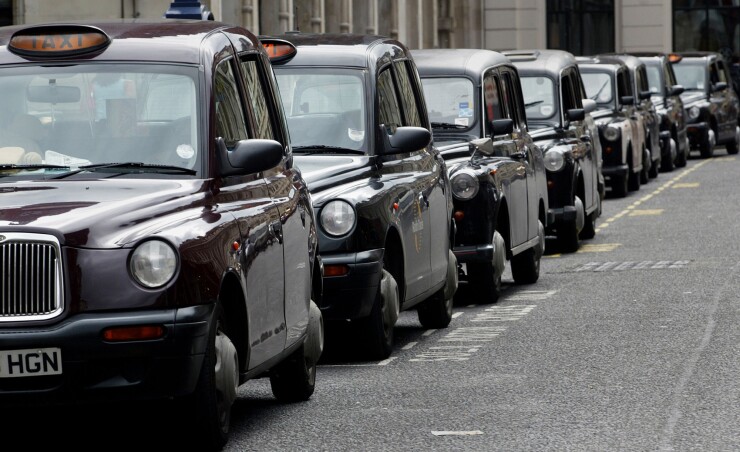London taxi drivers typically pay card acceptance fees ranging from 2.00% to 3.95%, and, due to increased card usage during the pandemic, their business costs have gone up.
“The average London taxi driver spends 60% or more of their monthly income on fuel, groceries, and other daily expenses,” said Costas Mantratzis, Viva Wallet’s chief product and innovation architect. “At the same time, taxi drivers' number one complaint about card acceptance is the steep transaction fees associated with card payments.”
Athens-based Viva Wallet was founded 20 years ago as a fintech, acquiring an e-money institution license from the Bank of Greece in 2013. Having bought Greek digital challenger bank Praxia in January 2020, Viva Wallet plans to act as a neobank, offering services such as loans and savings to its business customer base.

In 2019, Viva Wallet’s group revenues from acquiring services, payment account services and issuing services across Europe rose to €28.17 million from €18.89 million in 2018. The company raised €75 million in a series C fund-raising round in 2019.
Viva Wallet passports its Greek e-money license across the EU, but because of Brexit, it has had to additionally apply for a U.K. e-money institution license. Until this is granted, the U.K.’s Financial Conduct Authority allows it to operate under a
Viva Wallet uses its e-money license to give its London taxi clients a bank account and next-day funds settlement into the account. The company has partnered with U.K. clearing bank and banking-as-a-service provider ClearBank, which provides U.K. bank account sort code functionality and connectivity to the U.K.’s payments infrastructure for transfers to Viva Wallet accounts.
Drivers can manage their Viva Wallet account through a dashboard, which enables them to view each sales transaction, arrange refunds, or cancel charges in real time.
“We support the needs of a multi-operator set-up within the taxi fleet sector,” said Mantratzis. “Fleet owners can create more than one sub-account within their main account for each of their drivers and have full visibility via their dashboard. They can then identify individual drivers’ transactions and make payouts accordingly.”
Zeroed out
By using a Viva Wallet debit card for their business expenses, taxi drivers can reduce their acquiring fees to 0%, according to Mantratzis.
“Viva Wallet’s 0% acquiring fee proposition leverages both its acquiring and issuing capabilities,” said Zil Bareisis, a U.K.-based senior analyst for Celent. “It recognizes that many of its target customers — London taxi drivers — need to pay for business expenses as well as accept payments from their passengers.”
The company funds its customers’ rebates from interchange revenue on their debit card usage.
Viva Wallet isn’t the only company offering POS terminals to London’s taxis. Since 2016, Transport for London (TfL), the government body responsible for London’s transport infrastructure, has
Currently, 16 taxi POS terminal providers are TfL-certified in London, including U.S.-based Creative Mobile Technologies (CMT), iZettle, Ingenico, the Payment House,
Instead of tapping a card, TfL says that Londoners can pay for taxi rides on their smartphones using apps such as HailoPay, which enables them to enter their card details plus the driver's badge number and payment amount on a secure site.
Another app, Envoy Taxi, enables Londoners to call black cabs for pick-up and delivery of items such as groceries,
Alongside its TfL-certified card readers, which it launched in January 2020, Norway-based Payment House is rolling out its COVID-safe QR code payment product for London taxis as an alternative to taxi apps.
“Our experience is that a large proportion of black cab customers are tourists who don’t want to download and register their information in a taxi app,” said Staale Reiersen, the Payment House’s group director. The company has installed 1,000 TfL-certified terminals in London, and its goal is to roll out the readers into 3,000-5,000 London cabs a year once the situation normalizes, he said.
“As card and contactless payments have increased in response to the no- or low-touch safety requirements for handling any kind of in-person consumer transactions, it’s good to see new certified payment systems being introduced for London taxis,” said Miya Knights, head of industry insight at U.K. marketing software vendor Eagle Eye Solutions.
Viva Wallet has just launched its TfL-certified Viva Wallet Pocket Card Terminal and Bluetooth receipt printer. Its equipment is available without a contract and can either be used on a monthly subscription or for a one-off fee.
Viva Wallet charges a card-present acquiring fee of 1.16% for Visa/Mastercard/Maestro plus interchange from 0.2% and card scheme fees from 0.15% to 0.65%.
“Viva Wallet’s card reader is very fast and responsive and is a good size for the back of the cab,” said TX4 driver Mohammed Rahal.
Although Viva Wallet uses a third-party manufacturer for its terminals, it differs from other vendors in that it owns all its technology, said Mantratzis.
“We specially developed our payment card reader for London taxis, and have integrated the card reader with most of the taxi meters on the market,” said Mantratzis. “We’re now looking at offering the same technology to taxis in the other European countries we operate in.”
By integrating with the taxi meter, the payment card reader is able to automatically display the amount of the fare on its screen.
Stacy Whymark, an LEVC driver, said that all the driver has to do is to stop the taxi meter at the end of the journey and, as the Viva Wallet terminal is integrated with the meter, it handles everything else. “It’s great that you can lower your merchant fees whenever you use the Viva Wallet debit card," said Whymark.





